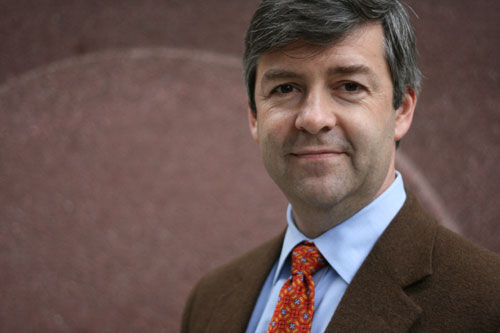“A well-formulated idea might still have the power to make a change,” says Robert Quinn, the executive director of Scholars at Risk (SAR). SAR promotes academic freedom and defends threatened scholars and academic communities worldwide.
“In a sense the threatened scholars make up a micro-cosmos,” Quinn says. “They are pieces in a larger game where organised forces are trying to monopolise knowledge and where the forces of pluralism will organise a reply. The latter is more difficult, because you have to cooperate even with people you disagree with. The underlying questions are: How sincere are we in allowing plurality? And to what lengths are the oppressors willing to go in order to suppress ideas?”
Magical opportunity
SAR, established in 2000, brings together about 150 universities worldwide, most of them in the USA. More than 1.500 scholars from 110 countries have asked for help, and to date SAR has been able to assist 200 of them, offering them temporary academic positions at Western institutions.
“We do matchmaking. First and foremost it is about identifying scholars suffering physical threats or extreme harassment. Next step is to bring them to a safe country. Then we try to offer them relevant work. These are very brave scholars: they speak up, unlike most of us. Most of the scholars we approach have been nominated by NGOs, human rights organisations or fellow scholars,” Quinn says.

MAGICAL OPPORTUNITY: Hosting a scholar is a magical opportunity to expose one’s community to the essence of academic life, reminding us what it is all about, according to Robert Quinn, the executive director of Scholars at Risk (SAR). (Photo: Runo Isaksen)
The idea is that the academics contribute to their host campuses through teaching, research, lectures and other activities. And that they return to their home countries when it is safe to do so.
“I think ten years is the correct measure of return, although we do see people going back after five years. Iraq is a special case, of course. By and large the scholars fresh from their home countries are not ready to jump into full-time teaching. But they can start offering guest lectures, gradually offering more classes.”
In general, salary is offered by the host institution. The legal status of the scholars concerned may differ. Some are refugees, others are temporary visitors.
“As host institution you don’t have to do everything for the scholar. Just tell us what you can do and then we will figure out something. That is the way this network has survived and expanded,” Quinn explains, emphasising that the benefits for both parties are clear. Scholars are free to live and work without fear, and SAR members get talented and inspiring educators in return.
“It’s a benefit just standing with other institutions saying: ‘Scholars and universities should not be attacked for merely doing their job.’ Hosting a scholar is a magical opportunity to expose one’s community to the essence of academic life, reminding us what it is all about,” says Quinn, who recently visited Norway to enlist more Norwegian scholars and institutions. So far, the University of Oslo is the only Norwegian member of SAR.
Freedom and dialogue
Hosting threatened scholars like Felix Ulombe Kaputu is but one of the activities carried out by SAR.
“There are three tracks, of which hosting threatened scholars is one. But hosting a scholar does not help much if we are not able to strengthen the universities, too, and their place in society. This, then, is the second track: engaging faculties in setting up training workshops, notably in developing countries, to make them defenders of academic freedom and dialogue. We hope to see a snowball effect,” Quinn says.
A third track is research. SAR is currently conducting a survey asking questions such as: What are the core elements of a university? What is academic freedom? What means are available for responding to threats to universities?
“The problem is that this territory is so poorly mapped. In a sense we contribute to setting up a new subfield of study: academic freedom studies. For let us face it: there might very well be gaps even between the two of us as to the exact meaning of, say, academic freedom,” Quinn says, admitting that it is crucial to feel the way carefully and to build a dialogue aimed at developing shared understanding.
“There are many landmines: for example religious universities versus secular, private versus public, and so on. I think the network, by virtue of our experience with scholars in over 100 countries, can offer some framework for approaching these difficult questions. Of course advocating academic freedom will be a never-ending process.”
To Robert Quinn personally, interaction with the scholars who are willing to speak up in the face of oppression and the staff going out of their way to help these scholars has been the most interesting aspect of this work.
“In essence it is a wonderful look at humanity. So if you ask me, why bother? I will say: because not to bother will have devastating consequences in the long run. The tension is there not only in Iraq or Afghanistan, but also in Europe and the US. Again: how sincere are we in allowing plurality?”
SCHOLARS AT RISK NETWORK (SAR)
- International network of universities and university colleges
- Promotes academic freedom
- Defends threatened scholars
- Defends scholarly communities
- Membership: open to accredited higher education institutions in any country committed to the principle that scholars should be free to work without fear or intimidation
- Activities: Organises lectures, conferences and public education events and undertakes research and advocacy
- Financing: Sponsored by a variety of trusts and foundations, including the Sigrid Rausing Trust, the Arcadia Trust and the Open Society Institute
- Secretariat: three full-time employees located at New York University
Runo Isaksen is an information adviser at The Norwegian Centre for International Cooperation in Higher Education (SIU).
This article was originally published in Global Knowledge no.2, 2007.
